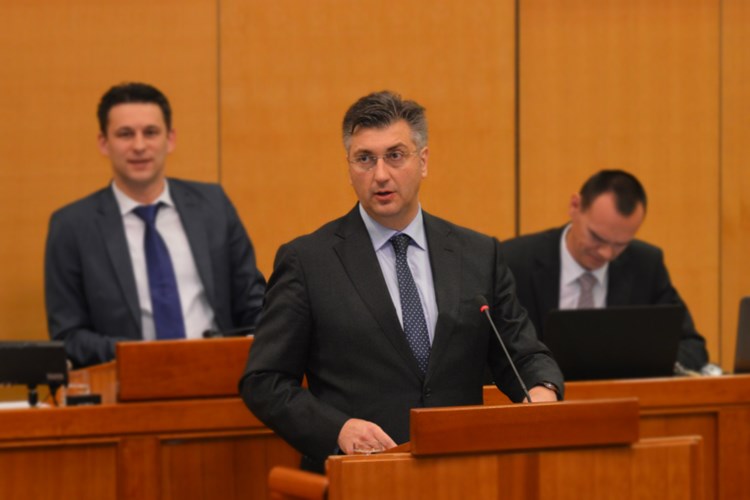- Published: 19.01.2017.
PM Plenkovic: It's important for Croatia to position itself in changed global circumstances
It is important how Croatia will position itself in 2017 against a background of the changed global circumstances, Prime Minister Andrej Plenkovic said in parliament on Wednesday.
Presenting a report to lawmakers on Croatian top officials' attendance at European Council meetings in Brussels in 2016, PM Plenkovic recalls that during 2016 the prime ministers of two EU member-states -- David Cameron of Great Britain and Matteo Renzi of Italy -- had stepped down after their defeats at referendums.
In June, Britons voted for exiting the 28-strong block, and in December Italians said at a referendum that they did not accept a package of constitutional reforms put forward by Renzi.
As for the Brexit referendum, Croatia's PM said that in his opinion organising such a referendum "is a serious, unforgivable political error made by (former Prime Minister) David Cameron".
Plenkovic insists that holding that referendum was unnecessary.
This was a lose-lose situation both for him (Cameron) and definitely for the United Kingdom, and we will still see repercussions for the European project, the Croatian premier said.
After the completion of Great Britain's exit from the EU, the Union will not be the same, he added.
In his address to the parliament, Plenkovic said that a large part of the talks on the margins of EU summits in 2016 had focused on the relations between the EU and Russia which should be redefined due to many changes in the balance of power.
In this context, a new kind of dialogue with Russia will be one of the major topics in 2017, Plenkovic said.
Therefore it is important how the European policy will be pursued in 2017 and how Croatia will position itself, notably after the victory of Donald Trump in the U.S. presidential election, the Croatian premier said.
Plenkovic praises Tusk for passionate speech about Croatia and Europe
Plenkovic recalled that European Council President Donald Tusk visited Zagreb on the occasion of the 25th anniversary of the international recognition of Croatia.
"In his capacity as the top official of the EU, Tusk showed how much he personally and European institutions respect Croatia and its achievements, role and contribution to the European project. I find his speech delivered in Croatian was amazing. There have been few non-Croats who delivered in this hall such a passionate and positive speech about Croatia and about Europe and our common values."
Plenkovic congratulated the newly-elected European Parliament President, Italian Antonio Tajani, on his appointment.
Borders should be protected through cooperation rather than walls
As for major topics on the European Council's agenda in 2016, Plenkovic recalled that those were migrations, safety and security, economic and social development, youth affairs and the EU foreign policy.
"When it comes to migrations, Croatia believes that a strategically balanced response of EU member-states, based on solidarity, is an optimum approach to migratory pressures management."
He recalled that Croatia's quota for accommodation of refugees is 1,600 and that to date 19 refugees have been relocated from Italy to Croatia.
Croatia has supported an overhaul of the European asylum system and advocates an efficient management of the EU's external borders. Zagreb is satisfied with the establishment of the European Border and Coastguard Agency, he added.
"Our priority is for the so-called eastern Mediterranean or Balkan route to remain closed," he said.
Politically and security-wise, that is extremely important for Croatia and we should persevere in dialogue with southeast European countries and all EU member-states with the purpose of having the route closed, the Croatian premier said.
This is an approach in which borders are protected by technologies and manpower and not by physical barriers, and this should be a permanent approach, Plenkovic said.
Malta will host an informal EU summit meeting in early February that is expected to discuss central Mediterranean routes for migrants coming from Africa. A series of new agreements have been signed with African countries from which most of those migrants arrive, he added.
As for economic topics, Plenkovic said that Croatia had supported extending the duration of the European fund for strategic investments until 2020.
Text: Hina
